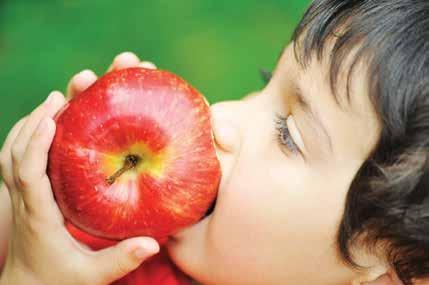
8 minute read
Parenting Pearls
Joyous Parenting Moments
By Sara Rayvych, MSEd
Tu B’Shvat is one of those days on the calendar that gets passed over and sometimes leaves us a little confused. Our explanation of “it’s the trees’ birthday” can sometimes cause more confusion to a child than just saying that we’re having a “fruit party.” I did have an interesting discussion today with my five-year-old about why trees need a birthday but I don’t think you need this article to help you with that. Personally, I focused with him on the need for birthdays so we know when to eat the fruits of the tree, and he was intrigued by the idea.
Before getting to the main topic of this article, I urge you to look more into this underappreciated yom tov, understand the ideas a bit further, and choose one that will appeal to your children to share with them. I know the schools will be covering this, but it’s still a springboard for a beautiful discussion with your child. You should also enjoy the nachas that comes with talking to your children about these types of ideas. Some possible themes are Rosh Hashana for trees (relevant to laws such as calculating maasros and orlah), the minhag to daven for a beautiful esrog, the seven species Israel is known for, and an appreciation for Eretz Yisroel.
An excellent children’s resource on Tu B’Shvat is Lag Ba’omer and Tu Bishvat with Bina, Benny and Chaggai Hayonah by Yaffa Ganz, published by Artscroll. The Book of Our Heritage by Rabbi Eliyahu Kitov is a wonderful resource for parents looking for ideas and a greater appreciation of the day.
In our homeschool, I try to prepare an assortment of fruits, grain items (usually cookie or cake type items) and a variety of grape juices to share with the children in a sit-down family “meal.” In previous years, we invited some friends to make it a more festive atmosphere.
You could ask why I put the time into this but I feel this goes beyond Tu B’Shvat, beyond the trees and even beyond flavored grape juice (if you can imagine that). I try to look at yomim tovim as not just a single event or time to commemorate but also as an opportunity to share some of the joy and beauty that is Torah and Judaism. There is so much that can overwhelm us when preparing for special occasions that we can lose sight of making it enjoyable. Pesach is celebrating the birth of our nation, when Hashem did open miracles for us, yet we often are distracted by all the work. Yom Kippur is a time to reevaluate ourselves and start fresh, yet we are often stressed by the fast and long prayers. Even during the most hectic yom tov, I hope to try to make it feel festive, and I hope I can, in some small way, pass on some of the beauty and happiness of being Jewish.
Tu B’Shvat is not stressful, it doesn’t require much advanced planning, and you don’t even need to buy a new outfit for each child. It’s the perfect day to spend time with your child, share something, and just enjoy. Why?
You can ask why I put a stress on creating this happiness on minor (and major) yomim tovim. We are a minority in this world and certainly in this country. Our children, even those who are sheltered, are inundated with outside influences. How many of us can say our kids didn’t notice anything other than Chanukah this past December? With so much from the outside attracting our kids’ attention, I feel it’s even more important that our children see what they already have as wonderful, amazing, and a source of joy.
On more than a few occasions, I’ve had gentiles ask me how my kids can handle not having the holidays celebrated by the dominant culture. It’s unfathomable to them that a child could survive not trick-or-treating. It’s a fair question, but it’s asked without the awareness that children in our community have so much already that even door-to-door candy doesn’t pull them. It’s my humble opinion that when children are secure in their own culture, other ideas won’t have the same appeal.
There are no guarantees in life, but logic dictates that a child who is happy and content won’t feel the same need to go elsewhere. An outsider sees what the frum child doesn’t have but has no idea what that child does get. It’s important that at least our children see what they have – and see how beautiful it is.
Creating memories
Sometimes it’s the unexpected moments that make an impact on you. A few years ago, probably around Chanukah time, my husband asked me what Chanukah was like for me as a child. I gave a simple, barely thoughtout answer, and it was only a few minutes later that it really sunk in.
My husband was born and raised in the former Soviet Union, and he didn’t come to America until he was an adult. As most of you probably know, it was not only forbidden and dangerous but life-threatening to keep Jewish practices in the USSR. So much that we take for granted he never had, and he never had Chanukah as a child. Initially, I had not appreciated that he was asking me to share with him something I took for granted but he never experienced. As it dawned on me what he was asking, it also gave me the wakeup call that I was creating those cherished childhood memories for my children. This unexpected kitchen encounter gave me a new appreciation for what my role could be.
I don’t think we often appreciate how much of an impact we have on our children when creating their childhood memories. Some of the most basic things we do can have a tremendous impact on their young, impressionable minds. Now that my oldest kids are teens, it often surprises me when they tell me what made the greatest impression upon them and gave them the greatest excitement when they were younger.
It’s easy to underestimate the impact a simple act can do for a child. I
still remember one of the first years that I made a Har Sinai cake with the kids. I thought I was simply doing a fun project with them. It made such an impression on my preschooler that all year he lived through the events at Har Sinai. Anything remotely resembling a mountain became Har Sinai. I still remember how months later he was raking leaves and telling me how he was creating Har Sinai.
Take the time to recognize that you have the incredible opportunity to create amazing Jewish memories for your child. Adding some fun to your celebrations can go a long way. Create simple, new traditions that will bring your children excitement thinking about them. Even just going for pizza the day before bedikas chametz each year can become something a child will look forward to year after year. Making a big deal over the exotic Tu B’Shvat fruits or family mishloach manos packing can become treasured memories if done year after year. What about other times?
Shabbos, Chanukah, Purim, Pesach, Shavuos and Yomim Noraim can all become days that create those deep feelings that draw a child in and keep them close. I chose to focus on Tu B’Shvat because it’s the easiest to not get distracted by and because it’s
almost here. Yes, every day I mentioned above should be a source of excitement and joy in being a Jewish child and adult. As parents, we should try to keep the happiness and joy in those days. We should try to make a concerted effort to not detract from our child’s enthusiasm with our stress or frustration in preparing for the big event. Sadly, we, as adults, are often so focused on the many important preparations that we don’t get a chance to really enjoy the day ourselves. How many of us show up to the seder already prepared to finish due to exhaustion? How many of us have spent so much time preparing
mishloach manos that by the time Purim arrives we’re too drained to give them out? I’m not laying blame on anyone here nor am I saying I’m guilt-free. I just want to bring out this point (for myself, as well) as a gentle reminder to allow ourselves to enjoy these days and share that feeling with our children.
Truly, anything we do can and should become a source of excitement for our families. Our days are filled with following Jewish law and communal/family customs. Bentching can be sung with excitement, while tzitzis can be kissed with joy. We get so used to something that we no longer appreciate it. By looking at something from our child’s perspective, we have the chance to make everything feel new and fresh. In some ways, we get to be kids.
Tu B’Shvat can be the springboard for joy in all areas of our life. Bring some fun and enjoyment into the day. Your children will thrive on the excitement, and you may find you look forward to these special days even more than ever before.
Sara Rayvych, MSEd, has her master’s in general and special education. She has been homeschooling for over 10 years in Far Rockaway. She can be contacted at RayvychHomeschool@gmail.com.












